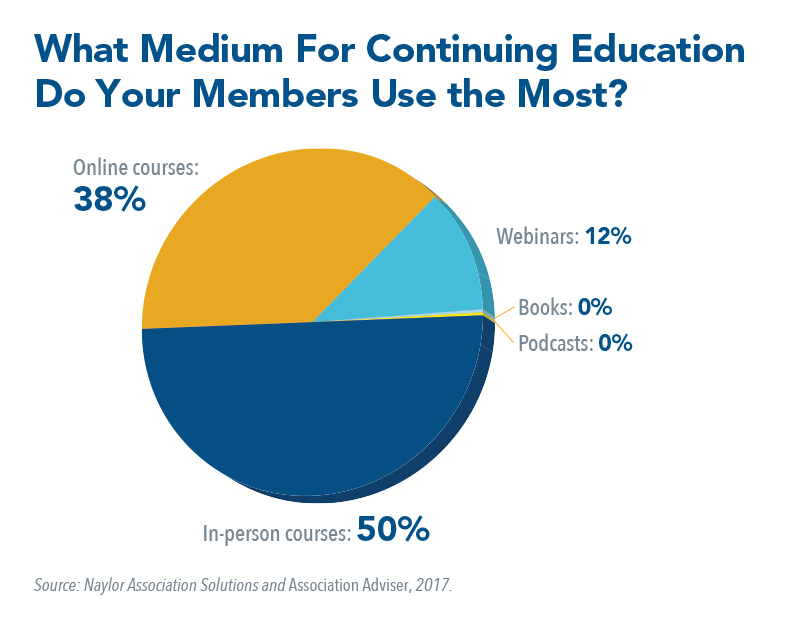Did You Know? Despite Living in a Tech Age, Association Members Still Prefer In-Person Courses
Our reader poll last month focused on how association members prefer to extend their professional education. Online courses? Webinars? Podcasts? Good old-fashioned books?
Half of respondents told us their members prefer in-person courses:

There could be several reasons for choosing an in-person continuing education course over other forms of professional learning. For starters, some credentials and certifications are only offered through in-person courses. Even if a certification is offered online, many people prefer learning from another human instead of a video screen or audio recording. There’s the networking and camaraderie aspect of learning in a group setting. There’s also the ability of a human instructor to gauge your level of understanding, to interpret the intent behind your questions and formulate a more comprehensive answer, and to customize the material to your educational or experiential background. These are nuances in sharing and gaining knowledge that aren’t yet mastered by one-way videos, podcasts, robots or other technology.
Speaking of technology in education, if you’re the instructor, your job is probably safe for a while longer.
In-person courses can also offer more of a comprehensive curriculum than other forms of education. As Patti Costello, M-CHEST, executive director of the Association for the Healthcare Environment explains, “[AHE prides] ourselves on offering courses with a curriculum, depth, and amount of interaction that is just as comprehensive and valuable as a full-fledged university.” A couple of books on a subject don’t offer the interaction many professionals want when expanding their knowledge base, and although online courses are becoming more popular, there is still the perception that online courses don’t measure up to the level of rigor, depth or excitement that in-person courses offer.
This isn’t to say that online courses aren’t worth an association professional’s time and effort. For many professionals who are balancing work, family and extracurricular obligations, online courses can be a convenient option that neatly fit into an already busy schedule. Top-tier online learning platforms offer discussion boards, live video instruction, chat rooms and other features that make online learning as interactive as the participant wants it to be.
Webinars were the third most-cited option for continuing education. As with online courses, webinars can be a convenient way to pick up continuing education credits or to invest a short amount of time learning about a new or focused topic. Most webinars range between 30 and 90 minutes, allowing attendees to pick up new information and insights with relatively little investment.
Books and podcasts as a way to continue your professional education received no votes. Maybe association professionals’ formal education has them burnt out on textbooks, or maybe this group wants to reserve time with a book for leisure reading.
Do you agree with these results? In your experience, what medium for learning is best? Leave us a comment below.

